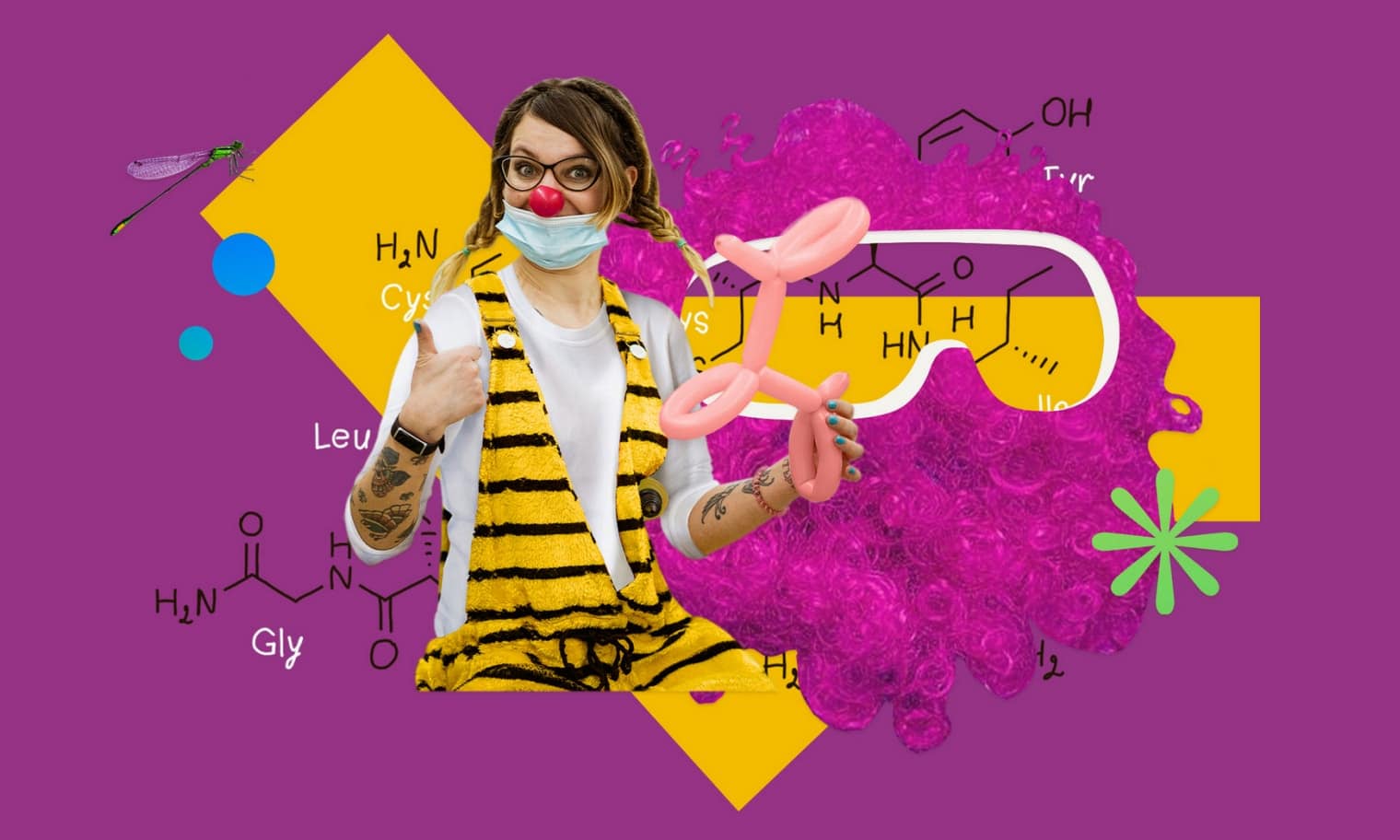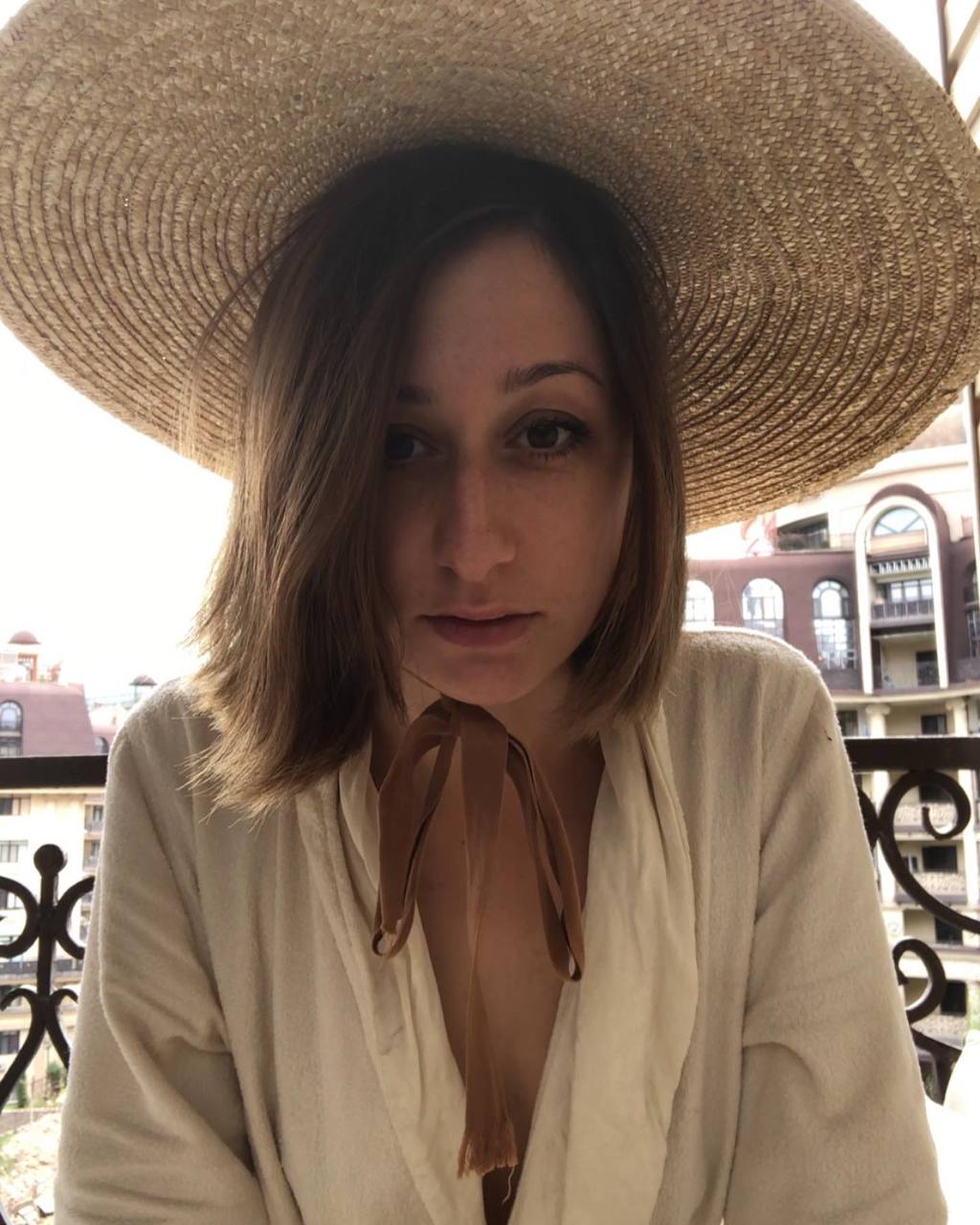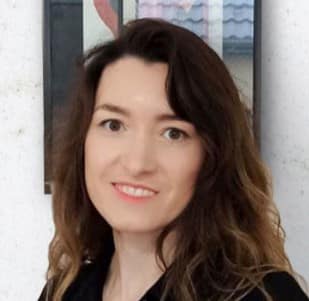![]()
Clown care is a project aimed at providing emotional support. Clowns work in hospital departments to support children, who fight serious illnesses, and make them laugh. It all began with an initiative from volunteers and grew into a professional organization supported by the charitable foundation ‚Tablietochki‘.
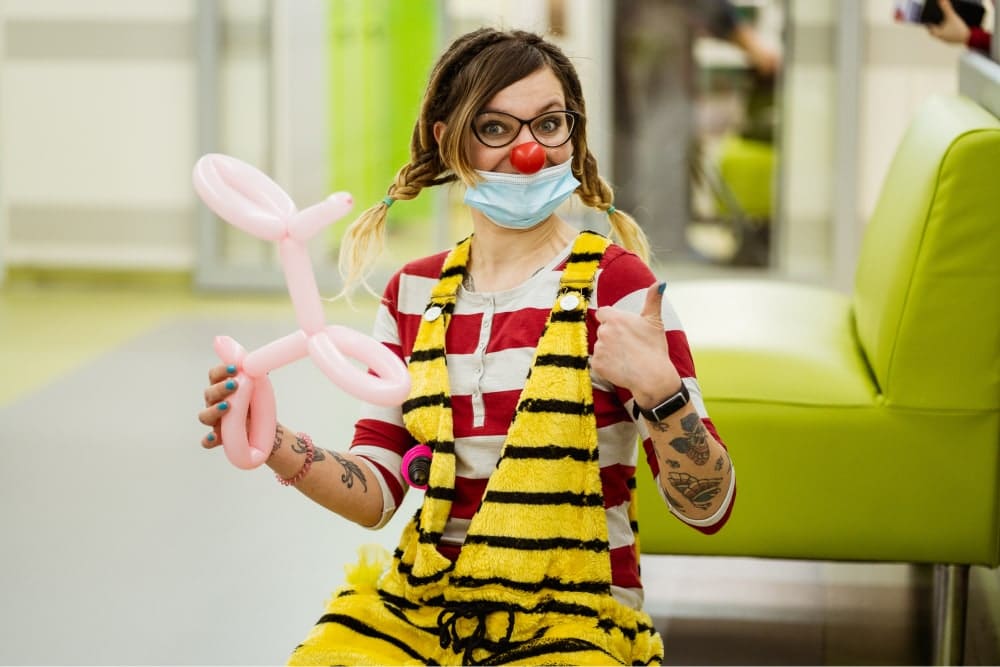
At the entrance to ‚Okhmatdyt‘, a special children’s hospital, Olya and her colleagues don bright clown costumes. They get color balloons and other entertainment tools ready. The last detail they make sure they have on their faces is a clown nose that is both part of their image and a mask at the same time. For now, Olya disappears and the clown Bu takes the stage.
The doors fly open and flamboyant clowns march the corridor down. With them the childhood vibes enter the hospital, which is quite rare among its numerous wards.
To Mongolia on a bike
Olha Bulkina was born and grew up in Kyiv into a family of creative people. Her dad is an actor and her mom used to work as a theater director. She spent her childhood at theater rehearsals and plays. She would often sleep either in dressing rooms or in a subway car or on her father’s lap once they were returning back home from a play.
Having grown up, Olya began her career as a chief editor and director at a TV channel. She also worked as a producer.
One day the 21-year-old Olya came across a performance of a street circus while taking a stroll through the Kontraktova Square in Kyiv. People in bright costumes and red noses were putting on a grand show, playing musical instruments. She was impressed by what she saw. After the performance she decided to talk to the circus artists.

Back then street art was in its infancy, so I was awed by what I saw
It turned out that those artists were traveling from Germany to Mongolia on self-made bicycles. They were pursuing a mission of volunteers and educators. They wanted to cover a distance of 7 thousand kilometers by dropping in various cities to teach clowning, juggling and music to street children or children from orphanages.
Children were shown that one could earn money through creativity.
Olya was excited by their story and decided to join them. She first helped them as an interpreter since the artists were living in an orphanage close to Kyiv. She fell in love with one of the clowns who offered her to follow the circus troupe to Mongolia. She took the offer.
The circus artists spent four months cycling, paying brief visits to different cities and performing with children. Olya taught herself clowning along the way, as well as juggling and street art. Eventually, she began taking part in various performances on a par with other artists.
We would take with us all musical instruments and costumes while living in tents. We would keep pedaling 10 hours a day. I acquired a lot of theater skills, practicing and honing my impromptu techniques. This lasted for 4 months. I was then stung by a venomous insect so I had to head back home.
Cancer and laughter
Upon her return to Kyiv, Olya could not find peace with herself or calm down. She already knew just how exciting life can be. After grieving for a while, Olya got back to their job on TV. She has been away from clowning for many years.
Then hard times came: Olya’s father fell ill – recurrent cancer. He underwent chemotherapy and four operations, which put a strain not only on him, but also on his daughter who was always by his side.
‚Cancer is a very treacherous thing. When facing the illness for the first time, you think your number is up. In fact, we tend not to take interest in the disease until we have it. Lots of myths and stereotypes began to be debunked after I began to do my own research on the topic’, says Olya.
Olya says that while her dad was undergoing treatment at a local oncologic dispensary, she supported him. They would often share a laugh. Her dad even wrote short stories about his life at the hospital.
When my dad was treated for cancer, we would constantly share a laugh. We both had the same healthy reaction to stress, namely, laughter.
‚We would often laugh hard at surreal stories at the hospital. Humor and laughter were a big help to me and my father. I understood just how important emotional help is for someone who is subjected to aggressive treatment. I cracked a joke sometimes and my dad did the same, while our stress level decreased. He then felt much better physically’.
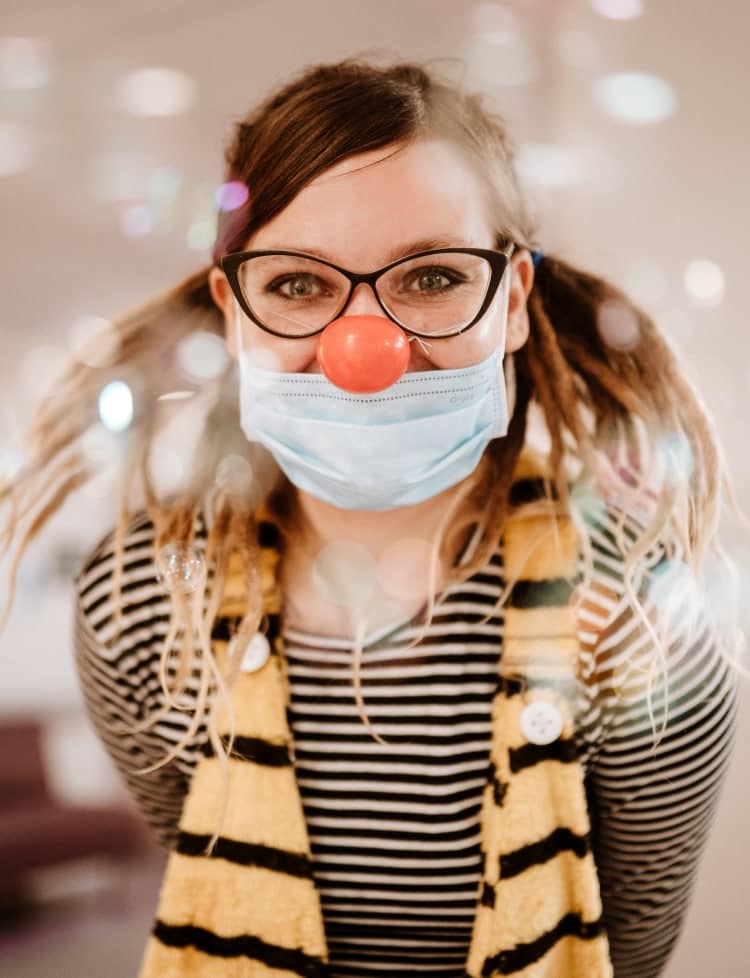
Often people simply do not know, how patients ill with cancer should be supported
Long and difficult treatment affected Olya’s usual life rhythm, having also deprived her of lots of inner resources. Apart from her ill father, she took notice of how many people were suffering and dying in intensive care units. Thus she understood she could not keep living as though nothing was happening. She could not pass a hospital indifferently by, without thinking of how difficult a path is taken by those inside. They are in such a great need of support from others.
Olya did a psychotherapy course as many of her friends had given her the cold shoulder, which made her feel lonely. It was not until after some time that she came to realize that her friends did so not because they wanted to abandon her, but because they did not know how to support a person who has cancer.
As soon as someone hears the word ‚cancer’, their minds conjure up images of bald and pale people who have one foot in the grave. They are simply frightened. Frightened even to talk about it. This is so because there is scarce information about diagnosis and how one should live with it.
One day Olya saw a post on Facebook about the charitable foundation ‚Tablietochki‘ setting up a school of hospital clowns who will work with children ill with cancer at hospitals. Tired after her father’s treatment as she was, Olya knew she wanted to be part of something important. She decided to go for it.
‚I already knew how to talk to people ill with cancer, what they needed. By that time I had already gained experience doing therapeutic clowning. The stars aligned and I made a decision to try‘.
After a few rounds of job interviews and special courses Olya joined the team of hospital clowns. Volunteers began visiting the children’s specialized hospital ‚Okhmatdyt‘ to support children undergoing treatment in the departments for cancer treatment, bone marrow transplantation and neurosurgery. They also visited children at the Kyiv province cancer dispensary.
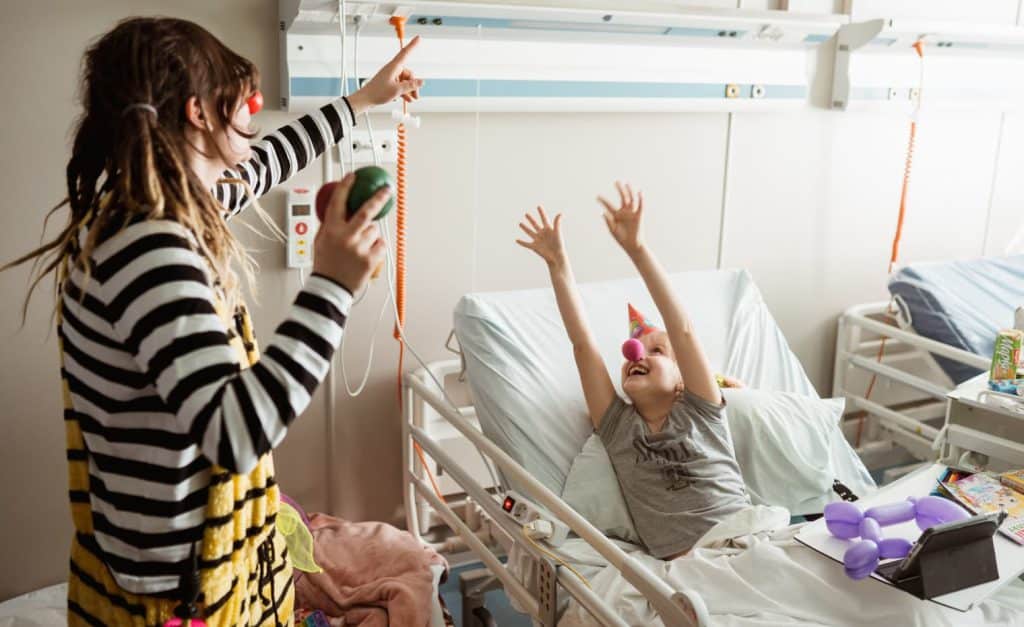
Hospital clowns are not only about laughter
According to Olya, hospital clowns are, first of all, friends for children. She also believes that they bear a stark contrast to other people working at hospitals. Hospital clowns help doctors establish contact with a child. They often accompany children during medical procedures and surgeries, or casually visit them in their wards to play.
‚The way I see their mission is this –
Childhood is to continue regardless of the circumstances as every child deserves it’.
Іf a child has found themselves at a hospital, it is necessary to make them regain the sense of normality’.
The task of hospital clowns is to offer a child the opportunity to experience necessary emotions, be it laughter or aggression. For example, in play a child may hit the clown with a balloon or forbid them to enter their ward.
‚We knock on the door of a ward, asking if we may come in. Sometimes children say ‚No‘. I then shut the door and apologize. A child can then say, ‚Wow! I said ‚No‘ and they listened to me! I am a personality and people reckon with my wishes‘. This also helps children understand that they are real personalities and not only the objects of medical treatment. Hospital clowns are not only about laughter.
Hospital clowns do not work according to a prearranged scenario. They improvise every time. They work depending on the child’s disposition, which they then build on and transform. In doing so, they provide a child with the opportunity to live through things they need to live through right at this moment while playing and laughing.
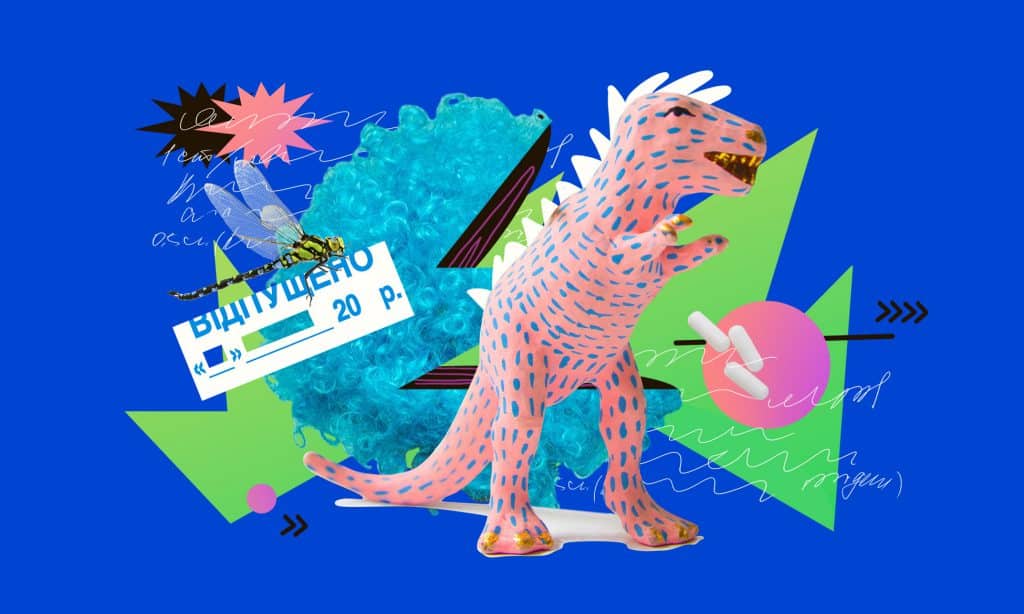
‚A hospital clown has to have empathy. It is not a performing art when you hit the stage to show how cool you are. It’s about improvisation that will never let you play the leading role. It is the child that is at the center of everything we do. We have to be ready for this since many people who exercise creative professions find self-expression important. You don’t visit children for recognition’.
Adults understand nothing
Often doctors ask hospital clowns to accompany children during different medical procedures.
‚We try to play both with children and doctors who play along. In this case the child sees the doctors not as someone who is to be feared, but someone with whom they can play. It is important to reduce the level of fear felt by the child before the doctor’.
Olya also says that the task of doctors is to heal the body, while the hospital clowns’ task is to heal emotions, on which children’s physical condition also depends.
One day a 4-year-old was bitterly crying in the oncology ward when doctors were trying to make an injection. The doctor went out of the ward into the corridor in tears, asking the clowns to talk to the girl.
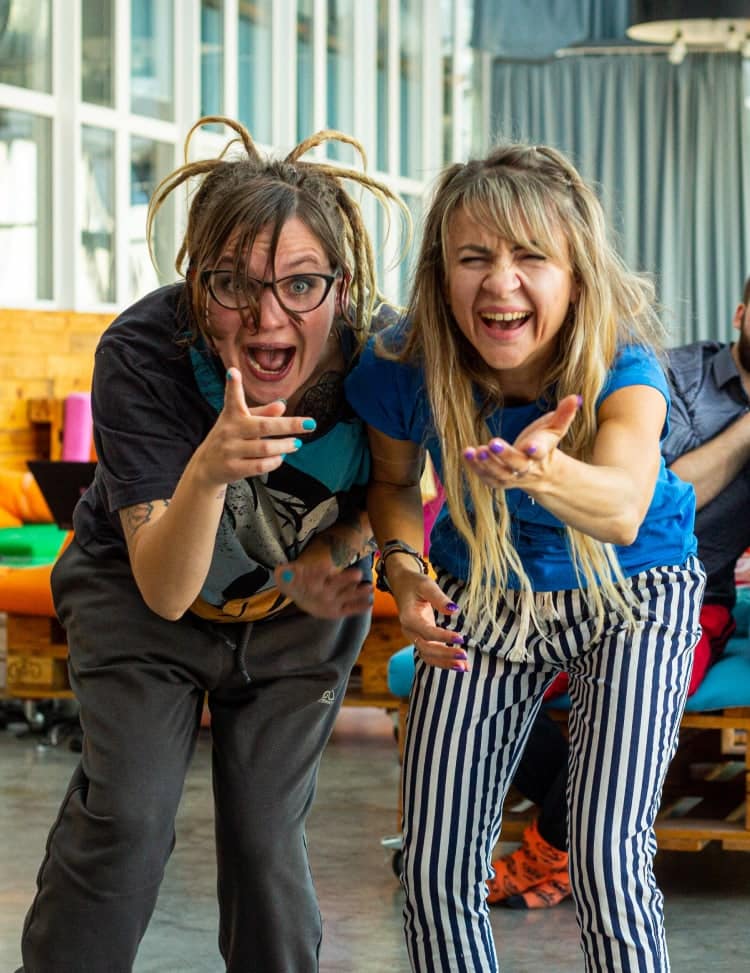
‚We entered the ward, although she was scared as everyone who came into her ward on that day caused her pain. We began talking to her at a distance, handing her over a flower made of balloons. She would not let us approach her, but she did stop crying. When we were leaving, she lifted her arm wrapped in a bandage and said, ‚Bye‘. It seemed like a banal thing to say, but in her micro-world of ordeal she was going through, this was a huge success. She was disillusioned with people who had been inflicting pain on her for a year. The fact that she got distracted and waved her hand at us meant that we earned her trust. It was an outstanding victory! After we went out of the ward, we took our artificial noses off and burst into tears’.
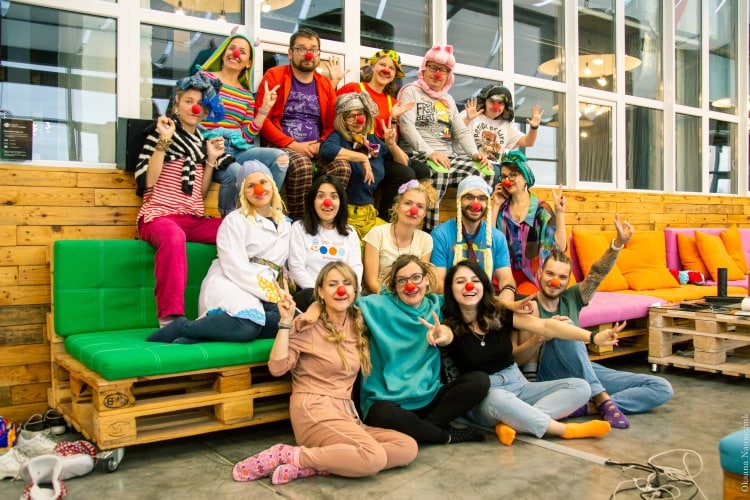
Olya also believes that sometimes one has to sit with the child and talk to them.
‚Children oftentimes think that adults ‚understand nothing‘. At the same time, they can talk to a clown. Children who spend much time at hospital, get out of touch with normal life‘.
We are trying to make them regain the sense of normality and make them happier as far as it is possible
Clowns never cry
When entering the hospital, hospital clowns leave their problems and issues behind. It is important for them to be open and sincere with kids. They prearrange their visit with healthcare workers, who tell them which children may be visited.
Olya will remember her first visits at the hospital for the rest of her life. She was so nervous that her knees were shaking. When she was leaving the hospital, she and her colleagues spent one hour and a half sitting and not exchanging a word with one another.
‚I remember us dropping out of work for a month since we were experiencing burnout‘.
Hospital clowns follow the rule of working in pairs. Olya says that her clown colleague is the only stable thing she has while at hospital as clowns never know in what emotional or physical condition a child behind the doors of the next ward will be. People who undergo chemotherapy are susceptible to frequent mood swings. When meeting a hospital clown a child can cheer up, while a few minutes later they can burst into tears.
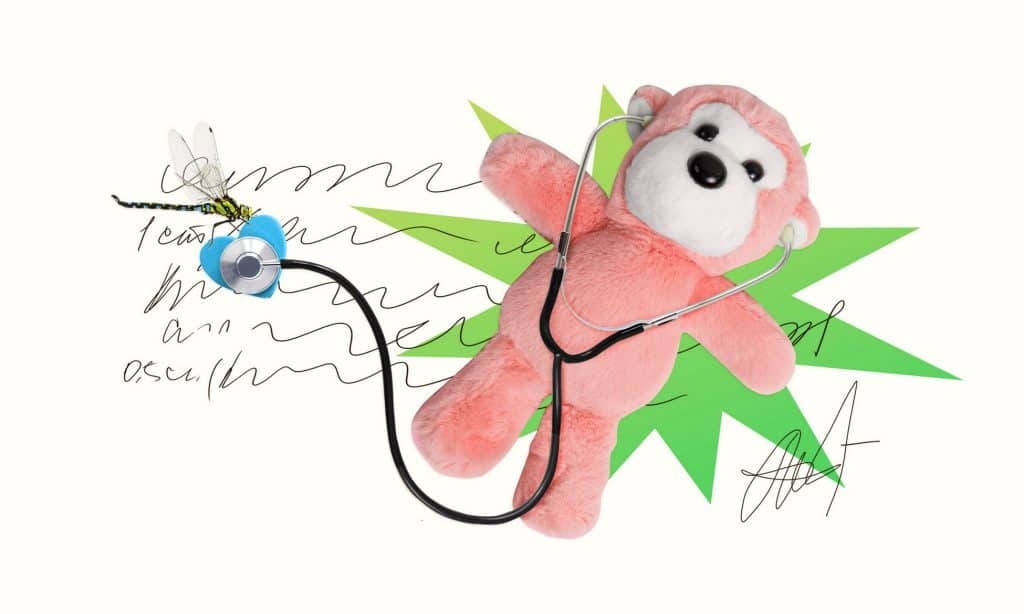
‚I always tell my colleagues to be ready for these mood swings. They have to understand in what emotional condition a child can be who is subjected to complex treatment. You should not fall into stupor after a child begins crying only a moment after they have been laughing with you. An unprepared hospital clown may get perplexed and think it is them who have done something wrong. Kids, for their own part, are very good at reading emotions. Therefore, a clown’s visit can do harm. One should prepare thoroughly for visits, since it implies a lot of mental work’.
One of the obligatory requirements for clown care is visiting a therapist. Hospital clowns who have not done so are not allowed to see children. Also, the clown never cries.
‚Behind the clown there is always a name, be it Olya or Maryna. My clown is called Bu. That is what kids used to call me. Bu never cries and can quickly switch attention to something else to provoke other emotions. Bu is my best and most sincere other half, a childlike part of me that inspires me a lot. At times I ask myself a question: how would Bu react? Then I understand that she would not be that concerned’.
Playing hide-and-seek in a bomb shelter
On February 24, after shelling, Olya grabbed her clown’s costume and took herself to ‚Okhmatdyt‘. Her team fled Kyiv while she stayed in the hospital’s bomb shelter to play with children and distract their attention. Before she had been working mainly with oncology departments, but on that day all children who were being treated at the hospital at that time required emotional support, especially those who were admitted with wounds.
Normally I try not to memorize the names of kids. I find it easier to work that way. I thought this approach would work perfectly fine with wounded kids. Nevertheless, I remember every injured child and their story. There was a girl who got her leg blown off. There was a boy who was extricated from his mom’s dead body. Another boy was trying to escape Bucha with his family by car. They got under shelling, with his dad and brother succumbing to wounds.
In the bomb shelter children were scared, just as their parents. In an attempt to take their minds off, Olya began playing hide-and-seek. She says that through play she can help the child adapt themselves to new stressful conditions.
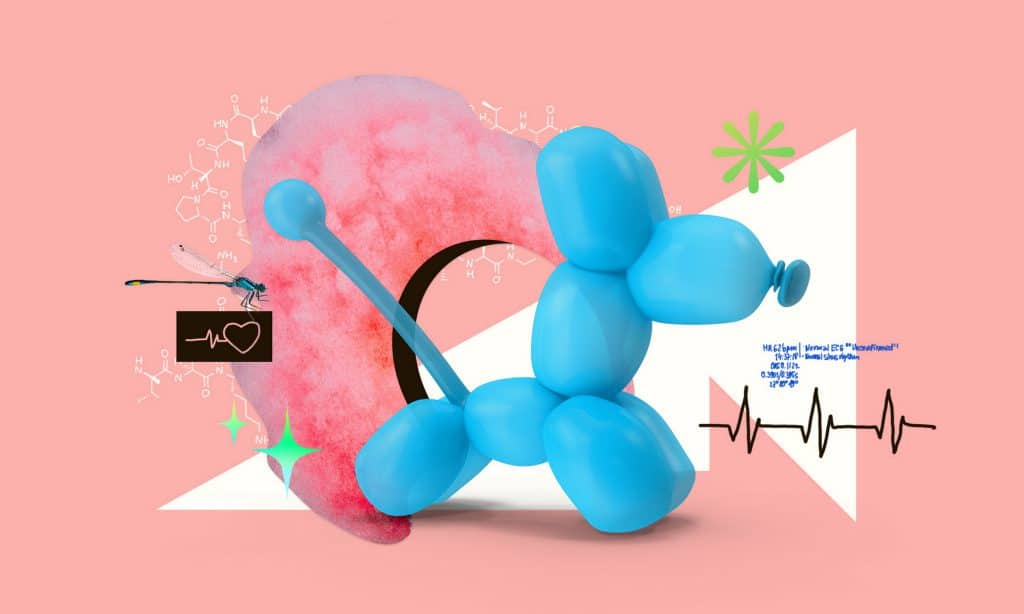
‚I once came to a department at a hospital and the children were already setting checkpoints from boxes, asking me to join in. They improvised air raid sirens wailing and hid me in a box taken out of a fridge to protect me. They were standing sentry at an improvised checkpoint themselves’.
Clowns as custodians of childhood
Olya is the founder and coach of the first Kyiv School Clown Care which is supported by the foundation ‚Tablietochki‘. Together with her colleague, Maryna Berdar, she taught other volunteers, having supervised the graduation of two student batches. Olya and Maryna studied at the Italian school for professionals ‚Soccorso Clown‘. The school offers certified preparation, which allows working with children at European clinics officially.
Now Maryna has returned to Kyiv. At the beginning of the Russian invasion she fled the city. She and Olya are planning to launch a new school and expand their team, while also founding the Association of hospital clowns of Ukraine.
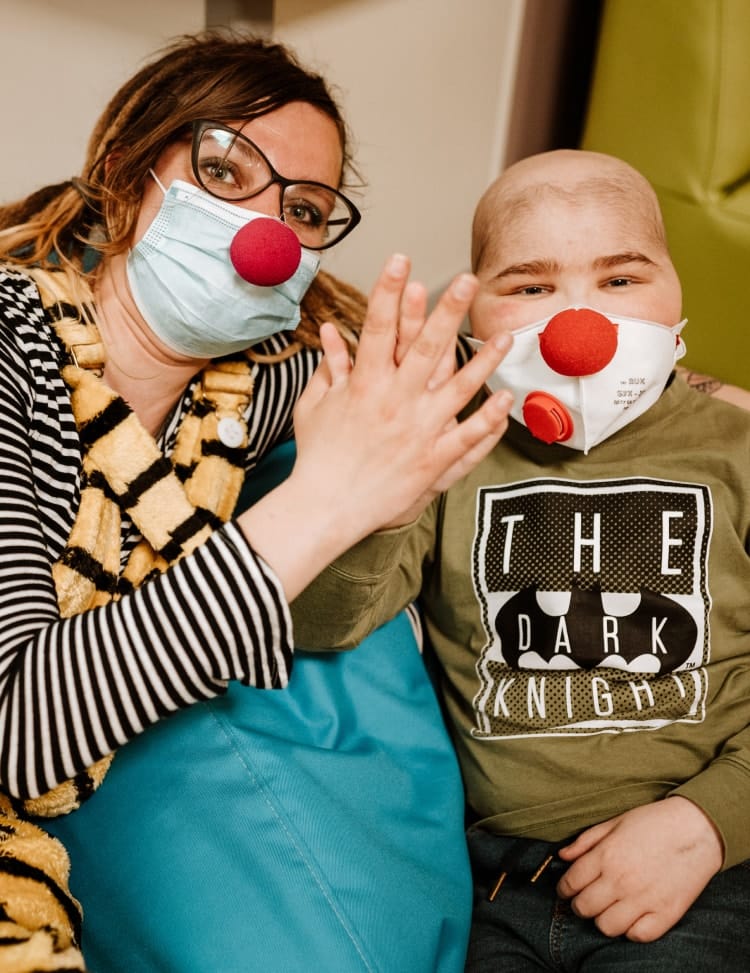
As of now, clown care is not on the list of professions exercised in Ukraine. Nonetheless, Olya and her team are working to rectify this.
In many European countries and the US hospital clowns exercise a full-fledged profession that makes them part of doctors’ subculture. It is my dream to see hospital clowns work in every children’s hospital.
Clowns are also needed at shelters for refugees and everywhere where children require help. Clowns are custodians of childhood.
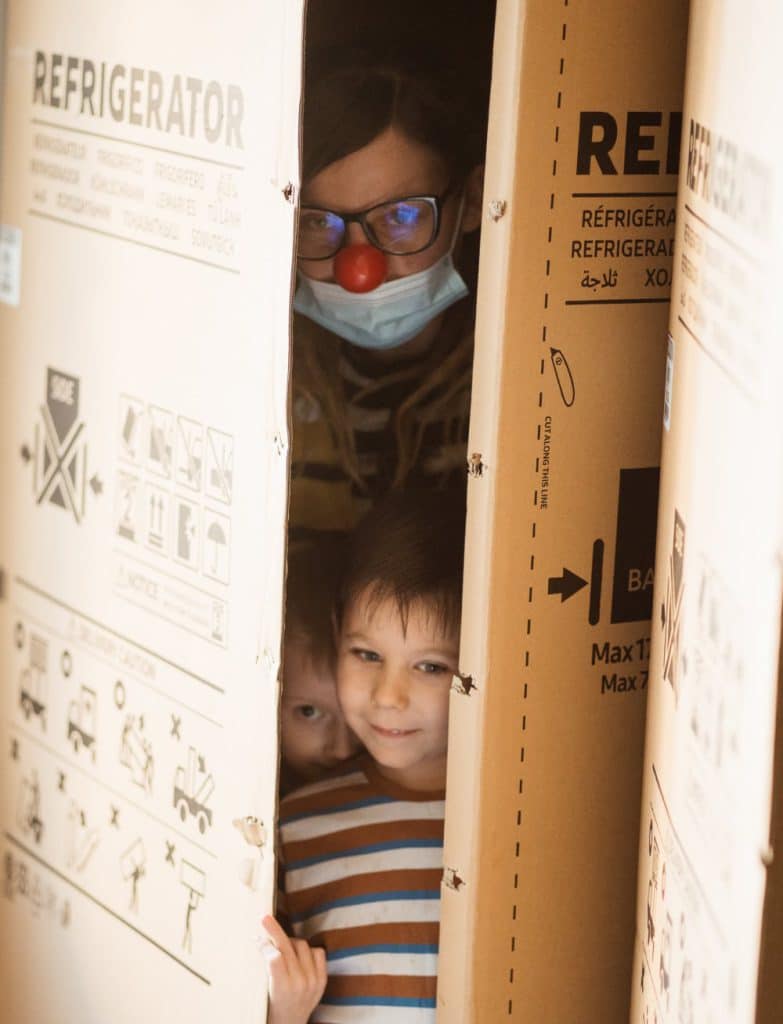
Якщо ви знайшли помилку в тексті, виділіть цей фрагмент і натисніть Ctrl + Enter

